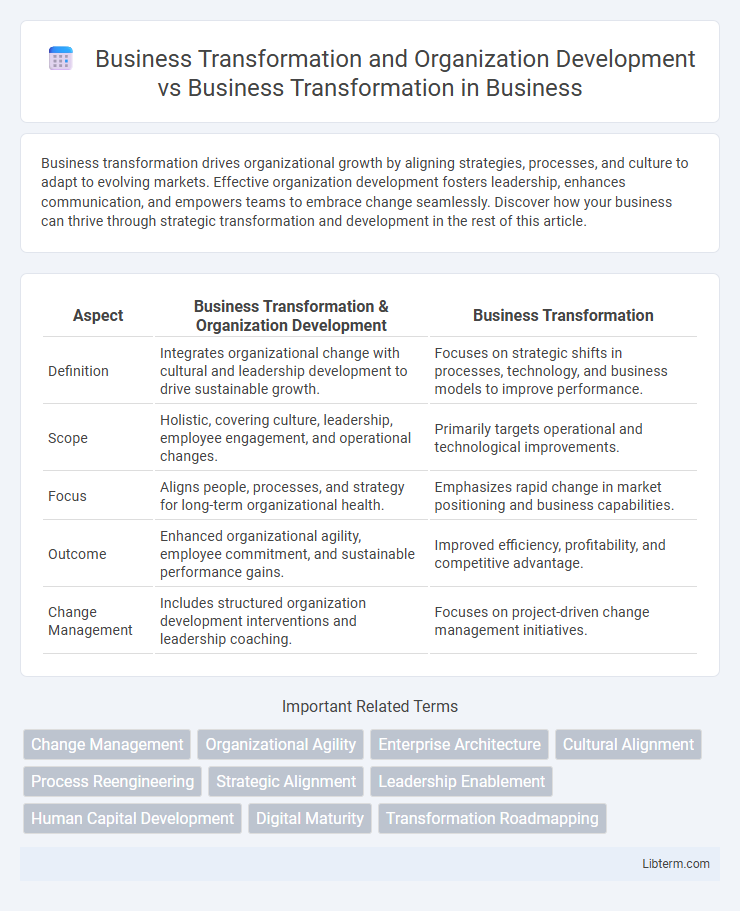Business transformation drives organizational growth by aligning strategies, processes, and culture to adapt to evolving markets. Effective organization development fosters leadership, enhances communication, and empowers teams to embrace change seamlessly. Discover how your business can thrive through strategic transformation and development in the rest of this article.
Table of Comparison
| Aspect | Business Transformation & Organization Development | Business Transformation |
|---|---|---|
| Definition | Integrates organizational change with cultural and leadership development to drive sustainable growth. | Focuses on strategic shifts in processes, technology, and business models to improve performance. |
| Scope | Holistic, covering culture, leadership, employee engagement, and operational changes. | Primarily targets operational and technological improvements. |
| Focus | Aligns people, processes, and strategy for long-term organizational health. | Emphasizes rapid change in market positioning and business capabilities. |
| Outcome | Enhanced organizational agility, employee commitment, and sustainable performance gains. | Improved efficiency, profitability, and competitive advantage. |
| Change Management | Includes structured organization development interventions and leadership coaching. | Focuses on project-driven change management initiatives. |
Introduction to Business Transformation and Organization Development
Business Transformation encompasses comprehensive changes in an organization's processes, culture, and technology to improve performance and adapt to market demands. Organization Development (OD) focuses on enhancing organizational effectiveness through planned interventions in structure, culture, and behavior. Introducing Business Transformation and Organization Development highlights their synergistic roles in driving sustainable change and fostering continuous improvement within enterprises.
Defining Business Transformation
Business Transformation involves a comprehensive redefinition of a company's core processes, strategies, and technologies to achieve significant performance improvements and competitive advantage. Organization Development focuses on guiding cultural and structural changes within the workforce to support these transformations effectively. Defining Business Transformation centers on orchestrating multi-dimensional shifts in business models and operational frameworks to drive sustainable growth and innovation.
Understanding Organization Development
Understanding Organization Development (OD) is crucial for effective Business Transformation, as OD focuses on improving organizational effectiveness through planned interventions in processes, structures, and culture. While Business Transformation encompasses a broader scope involving technological innovation, market repositioning, and strategic shifts, OD specifically targets human and organizational dynamics to support sustainable change. Integrating OD principles ensures that transformation initiatives align with employee engagement and leadership development, maximizing overall business performance.
Core Differences Between Business Transformation and Organization Development
Business Transformation involves comprehensive changes to a company's processes, technology, and culture to improve performance and adapt to market demands, focusing on rapid, large-scale shifts. Organization Development emphasizes planned, gradual interventions aimed at enhancing organizational effectiveness, employee engagement, and culture through behavioral science and change management techniques. The core difference lies in Business Transformation's focus on strategic, structural overhaul versus Organization Development's emphasis on human dynamics and continuous improvement within the existing framework.
Key Objectives of Business Transformation
Business Transformation centers on redefining core business processes, adopting innovative technologies, and aligning organizational culture to achieve significant improvements in performance, agility, and customer experience. The key objectives include enhancing operational efficiency, driving digital innovation, and fostering market responsiveness to sustain competitive advantage. In contrast, Organization Development emphasizes planned change in organizational culture and employee capabilities to support long-term growth and adaptability.
Main Goals of Organization Development
Business Transformation involves comprehensive changes to a company's operations, technology, and culture to improve overall performance and adapt to market demands. Organization Development specifically targets enhancing employee engagement, improving communication, and fostering a collaborative work environment to sustain long-term organizational effectiveness. The main goals of Organization Development focus on increasing workforce capabilities, promoting continuous learning, and facilitating change management to support successful business transformation initiatives.
Integrating Business Transformation with Organization Development
Integrating Business Transformation with Organization Development enhances change initiatives by aligning strategic shifts with cultural and structural evolution, leading to sustainable growth. This fusion leverages organizational development practices such as leadership development, employee engagement, and process optimization to support transformational goals. Companies adopting this integrated approach achieve higher adaptability and improved performance, accelerating their competitive advantage in dynamic markets.
Challenges in Aligning Strategy and Culture
Challenges in aligning strategy and culture during Business Transformation often result from conflicting organizational values and employee resistance to change, which hinder effective execution of strategic goals. Organization Development emphasizes diagnosing and reshaping cultural elements to support transformational initiatives, ensuring harmony between leadership vision and workforce behavior. Successful alignment requires continuous communication, adaptive leadership, and embedding cultural change into performance metrics to sustain strategic momentum.
Measuring Success in Business Transformation vs Organization Development
Measuring success in Business Transformation requires tracking key performance indicators (KPIs) such as revenue growth, operational efficiency improvements, and market share expansion to evaluate the impact of strategic initiatives. In contrast, Organization Development success is assessed through employee engagement levels, cultural alignment, and behavioral change metrics that reflect improved organizational health and adaptability. Both approaches benefit from continuous feedback loops and data-driven insights to ensure sustainable transformation and development outcomes.
Choosing the Right Approach for Sustainable Growth
Business Transformation and Organization Development both drive sustainable growth, yet Business Transformation emphasizes large-scale change in processes, technology, and culture to achieve competitive advantage. Organization Development focuses on improving internal capabilities, employee engagement, and adaptive leadership to foster long-term resilience. Choosing the right approach depends on the company's current challenges: opt for Business Transformation when rapid innovation and market shifts demand overhaul, or Organization Development when enhancing workforce agility and internal dynamics ensures lasting success.
Business Transformation and Organization Development Infographic

 libterm.com
libterm.com